Related Research Articles

Rhodesia, officially from 1970 the Republic of Rhodesia, was an unrecognised state in Southern Africa from 1965 to 1979, equivalent in territory to modern Zimbabwe. Rhodesia was the de facto successor state to the British colony of Southern Rhodesia, which had been self-governing since achieving responsible government in 1923. A landlocked nation, Rhodesia was bordered by South Africa to the south, Bechuanaland to the southwest, Zambia to the northwest, and Mozambique to the east. From 1965 to 1979, Rhodesia was one of two independent states on the African continent governed by a white minority of European descent and culture, the other being South Africa.
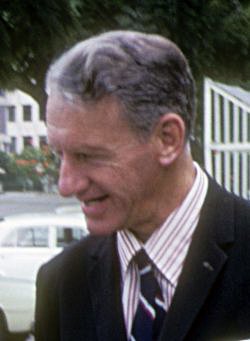
Ian Douglas Smith was a Rhodesian politician, farmer, and fighter pilot who served as Prime Minister of Rhodesia from 1964 to 1979. He was the country's first premier not born abroad, and led the predominantly white government that unilaterally declared independence from the United Kingdom in November 1965 following prolonged dispute over the terms, particularly British demands for black majority rule. He remained Prime Minister for almost all of the 14 years of international isolation that followed, and oversaw Rhodesia's security forces during most of the Bush War, which pitted the unrecognised administration against communist-backed black nationalist guerrilla groups. Smith, who has been described as personifying white Rhodesia, remains a highly controversial figure.

Zimbabwe Rhodesia, alternatively known as Zimbabwe-Rhodesia, also informally known as Zimbabwe or Rhodesia, and sometimes as Rhobabwe, was a short-lived sovereign state that existed from 1 June 1979 to 18 April 1980, though lacked international recognition. Zimbabwe Rhodesia was preceded by another state named the Republic of Rhodesia and was briefly under a British-supervised transitional government sometimes referred to as a reestablished Southern Rhodesia, which according to British constitutional theory had remained the lawful government in the area after Unilateral Declaration of Independence (UDI) in 1965. About three months later, the re-established colony of Southern Rhodesia was granted internationally recognised independence within the Commonwealth as the Republic of Zimbabwe.

The Rhodesian Front was a right-wing conservative political party in Southern Rhodesia, subsequently known as Rhodesia. It was the last ruling party of Southern Rhodesia prior to that country's unilateral declaration of independence, and the ruling party of Rhodesia from 1965 until 1979. Led first by Winston Field, and, from 1964, by Ian Smith, the Rhodesian Front was the successor to the Dominion Party, which was the main opposition party in Southern Rhodesia when that territory was a part of the Federation of Rhodesia and Nyasaland. The RF was formed in March 1962 by conservative white Rhodesians who opposed regional decolonisation and majority rule. It carried the general election in Southern Rhodesia that December, and remained in power until 1979.

Zvishavane is a mining town in Midlands Province, Zimbabwe. Surrounded by low hills, it lies 97 kilometres (60 mi) west of Masvingo, on the main Bulawayo-Masvingo road. Other roads lead from Zvishavane to Gweru, 121 kilometres (75 mi) north, and Mberengwa, 27 kilometres (17 mi) south-west. It is also on direct rail links to Gweru and Beit Bridge which then link up with Harare and Bulawayo in Zimbabwe and to Maputo in Mozambique, and Pretoria in South Africa. It has a private airport serving the city.

The Rhodesian Bush War, also called the Second Chimurenga as well as the Zimbabwe War of Liberation, was a civil conflict from July 1964 to December 1979 in the unrecognised country of Rhodesia.
The National Railways of Zimbabwe (NRZ), formerly Rhodesia Railways, is a state-owned company in Zimbabwe that operates the country's national railway system.

The Parliament of Zimbabwe is the bicameral legislature of Zimbabwe composed of the Senate and the National Assembly. The Senate is the upper house, and consists of 80 members, 60 of whom are elected by proportional representation from ten six-member constituencies corresponding to the country's provinces. Of the remaining 20 seats, 18 are reserved for chiefs, and two for people with disabilities. The National Assembly is the lower house, and consists of 270 members. Of these, 210 are elected from single-member constituencies. The remaining 60 seats are reserved for women, and are elected by proportional representation from ten six-member constituencies corresponding to the country's provinces.

Rhodesia had limited democracy in the sense that it had the Westminster parliamentary system with multiple political parties contesting the seats in parliament, but as the voting was dominated by the White settler minority, and Black Africans only had a minority level of representation at that time, it was regarded internationally as a racist country.
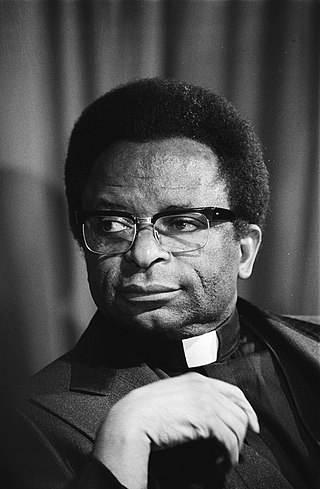
General elections were held in Rhodesia in April 1979, the first where the majority black population elected the majority of seats in parliament. The elections were held following the Internal Settlement negotiated by the Rhodesian Front government of Ian Smith and were intended to provide a peaceful transition to majority rule on terms not harmful to White Rhodesians. In accordance with the Internal Settlement, on 1 June, Rhodesia officially became the nation of Zimbabwe Rhodesia, under the government of the United African National Council elected in the 1979 elections. The Internal Settlement was not approved internationally but the incoming government under Bishop Abel Muzorewa did decide to participate in the Lancaster House talks which led to the end of the dispute and the creation of Zimbabwe.
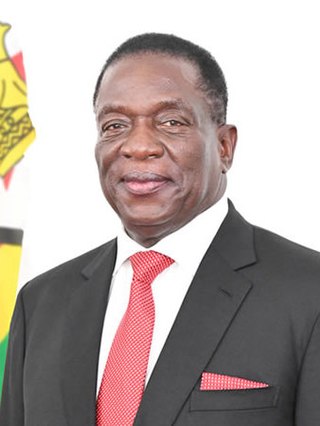
Emmerson Dambudzo Mnangagwa is a Zimbabwean politician who has served as President of Zimbabwe since 24 November 2017. A member of ZANU–PF and a longtime ally of former President Robert Mugabe, he held a series of cabinet portfolios and was Mugabe's Vice-President until November 2017, when he was dismissed before coming to power in a coup d'état. He secured his first full term as president in the disputed 2018 general election.

General elections were held in Southern Rhodesia in February 1980 to elect a government which would govern the country after it was granted internationally recognised independence as Zimbabwe, in accordance with the conclusions of the Lancaster House Agreement. The result was a victory for ZANU, which won 57 of the 100 seats. Its leader, Robert Mugabe became the first Prime Minister of Zimbabwe when the country officially became independent from the United Kingdom in April.

The history of the Jews in Zimbabwe reaches back over one century. Present-day Zimbabwe was formerly known as Southern Rhodesia and later as Rhodesia.
Harare North is a constituency of the National Assembly of the Parliament of Zimbabwe, located in the northern suburbs of Harare. An older constituency, Salisbury North, existed in the Parliament of Rhodesia between 1924 and 1979. The current MP for Harare North since 2018 is Rusty Markham of the Movement for Democratic Change Alliance.
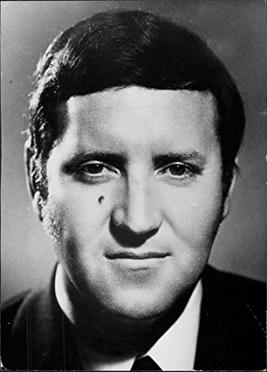
Rowan Cronjé was a Rhodesian politician who served in the cabinet under prime ministers Ian Smith and Abel Muzorewa, and was later a Zimbabwean MP. He emigrated to South Africa in 1985 and served in the government of Bophuthatswana.
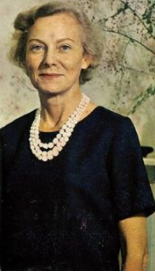
Janet Duvenage Smith, CLM, was the wife of Ian Smith, Prime Minister of Rhodesia from 1964 to 1979. Born in Cape Town, South Africa, she studied history at the University of Cape Town and became a teacher. In 1942, she married Piet Duvenage, a rugby player, and had two children. He died in an accident on the rugby field in 1947. The next year, a short visit with family in Southern Rhodesia became permanent when she accepted a teaching job in Selukwe. There, she met her future husband, Ian Smith, who had recently come home from the Second World War. In 1948, the couple got married and bought a farm, and Ian was elected to the Southern Rhodesian Legislative Assembly.

Beira-Bulawayo railway, also called Machipanda railway, Beira-Harare-Bulawayo railway and Beira railway, is a railway that connects the city of Beira, Mozambique, to the city of Bulawayo, in Zimbabwe. It is 850 km long, in a 1067 mm gauge.

Oriah Anthony Gara was a Zimbabwean businessman and politician. He was a member of the House of Assembly of Zimbabwe for Mbare East from 1990 to 2000 and served as deputy minister of local government, rural and urban development from 1995 until 2000. Before entering Parliament, he was a member of the Harare City Council and served as mayor of Harare from 1985 to 1986.
Peter William Hewlett is a Zimbabwean farmer and politician who served as a member of the House of Assembly of Zimbabwe from 1990 to 2000. A member of ZANU–PF, he represented the Zhombe and Kwekwe North constituencies.

David Colville Smith was a farmer and politician in Rhodesia and its successor states, Zimbabwe Rhodesia and Zimbabwe. He served in the cabinet of Rhodesia as Minister of Agriculture from 1968 to 1976, Minister of Finance from 1976 to 1979, and Minister of Commerce and Industry from 1978 to 1979. From 1976 to 1979, he also served Deputy Prime Minister of Rhodesia. He continued to serve as Minister of Finance in the government of Zimbabwe Rhodesia in 1979. In 1980, he was appointed Minister of Trade and Commerce of the newly independent Zimbabwe, one of two whites included in the cabinet of Prime Minister Robert Mugabe.
References
- ↑ "MPs and Senators declared elected after 30 July 2018_harmonised elections". veritaszim.net. Retrieved 19 April 2020.
- ↑ Holderness, Hardwicke (1985). Lost Chance: Southern Rhodesia, 1945-58. Zimbabwe Publishing House. p. 134. ISBN 978-0-949932-88-4.
- ↑ Who's who of Rhodesia, Mauritius, Central and East Africa. Wooten & Gibson. 1971. p. 55.
- ↑ Report of the Secretary for Justice, Internal Affairs and Housing for the Year Ended 31st December, 1955. Government Printer, South Africa. 1954. p. 6.
- ↑ Woodhouse, Susan (2018). Garfield Todd: The End of the Liberal Dream in Rhodesia. African Books Collective. p. 75. ISBN 978-1-77922-324-1.